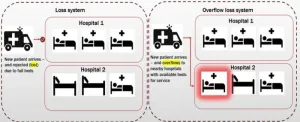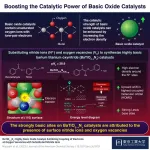(Press-News.org) In a study with 22 pairs of identical twins, Stanford Medicine researchers and their colleagues have found that a vegan diet improves cardiovascular health in as little as eight weeks.
Although it’s well-known that eating less meat improves cardiovascular health, diet studies are often hampered by factors such as genetic differences, upbringing and lifestyle choices. By studying identical twins, however, the researchers were able to control for genetics and limit the other factors, as the twins grew up in the same households and reported similar lifestyles.
“Not only did this study provide a groundbreaking way to assert that a vegan diet is healthier than the conventional omnivore diet, but the twins were also a riot to work with,” said Christopher Gardner, PhD, the Rehnborg Farquhar Professor and a professor of medicine. “They dressed the same, they talked the same and they had a banter between them that you could have only if you spent an inordinate amount of time together.”
The study will publish Nov. 30 in JAMA Network Open. Gardner is the senior author. The study was co-first authored by Matthew Landry, PhD, a former Stanford Prevention Research Center postdoctoral scholar, now at the University of California, Irvine, and Catherine Ward, PhD, a post-doctoral scholar at the center.
Twin participants
The trial, conducted from May to July 2022, consisted of 22 pairs of identical twins for a total of 44 participants. The study authors selected healthy participants without cardiovascular disease from the Stanford Twin Registry — a database of fraternal and identical twins who have agreed to participate in research studies — and matched one twin from each pair with either a vegan or omnivore diet.
Both diets were healthy, replete with vegetables, legumes, fruits and whole grains and void of sugars and refined starches. The vegan diet was entirely plant-based, included no meat or animal products such as eggs or milk. The omnivore diet included chicken, fish, eggs, cheese, dairy and other animal-sourced foods.
During the first four weeks, a meal service delivered 21 meals per week — seven breakfasts, lunches and dinners. For the remaining four weeks, the participants prepared their own meals.
A registered dietitian, or “diet whisperer,” according to Gardner, was on call to offer suggestions and answer questions regarding the diets during the duration of the study. The participants were interviewed about their dietary intake and kept a log of the food they ate.
Forty-three participants completed the study which, Gardner said, demonstrates how feasible it is to learn how to a prepare a healthy diet in four weeks.
“Our study used a generalizable diet that is accessible to anyone, because 21 out of the 22 vegans followed through with the diet,” said Gardner, who is a professor in the Stanford Prevention Research Center. “This suggests that anyone who chooses a vegan diet can improve their long-term health in two months, with the most change seen in the first month.”
Improving health
The authors found the most improvement over the first four weeks of the diet change. The participants with a vegan diet had significantly lower low-density lipoprotein cholesterol (LDL-C) levels, insulin and body weight — all of which are associated with improved cardiovascular health — than the omnivore participants.
At three time points — at the beginning of the trial, at four weeks and at eight weeks — researchers weighed the participants and drew their blood. The average baseline LDL-C level for the vegans was 110.7 mg/dL and 118.5 mg/dL for the omnivore participants; it dropped to 95.5 for vegans and 116.1 for omnivores at the end of the study. The optimal healthy LDL-C level is less than 100.
Because the participants already had healthy LDL-C levels, there was less room for improvement, Gardner said, speculating that participants who had higher baseline levels would show greater change.
The vegan participants also showed about a 20% drop in fasting insulin — higher insulin level is a risk factor for developing diabetes. The vegans also lost an average of 4.2 more pounds than the omnivores.
“Based on these results and thinking about longevity, most of us would benefit from going to a more plant-based diet,” Gardner said.
The vegan participants (and the omnivores to some extent) did the three most important things to improve cardiovascular health, according to Gardner: They cut back on saturated fats, increased dietary fiber and lost weight.
A global flair
Gardner emphasizes that although most people will probably not go vegan, a nudge in the plant-based direction could improve health. “A vegan diet can confer additional benefits such as increased gut bacteria and the reduction of telomere loss, which slows aging in the body,” Gardner said.
“What’s more important than going strictly vegan is including more plant-based foods into your diet,” said Gardner, who has been “mostly vegan” for the last 40 years. “Luckily, having fun with vegan multicultural foods like Indian masala, Asian stir-fry and African lentil-based dishes can be a great first step.”
Gardner is a member of the Stanford Cardiovascular Institute, the Wu Tsai Human Performance Alliance, the Maternal and Child Health Research Institute, and the Stanford Cancer Institute.
The study was funded by the Vogt Foundation; the Stanford Clinical and Translational Science Award; and the National Heart, Lung and Blood Institute.
# # #
About Stanford Medicine
Stanford Medicine is an integrated academic health system comprising the Stanford School of Medicine and adult and pediatric health care delivery systems. Together, they harness the full potential of biomedicine through collaborative research, education and clinical care for patients. For more information, please visit med.stanford.edu.
END
MIT geologists have found that a clay mineral on the seafloor, called smectite, has a surprisingly powerful ability to sequester carbon over millions of years.
Under a microscope, a single grain of the clay resembles the folds of an accordion. These folds are known to be effective traps for organic carbon.
Now, the MIT team has shown that the carbon-trapping clays are a product of plate tectonics: When oceanic crust crushes against a continental plate, it can bring rocks to the surface that, over ...
About The Study: In this study of 3 million U.S. adults, anxiety and depression were significantly higher among adults ages 18 to 39 compared with adults age 40 and older during the COVID-19 pandemic. Less favorable economic conditions and responses to social upheaval may have contributed to young adults’ worse mental well-being. These findings suggest a need for greater mental health care and economic policies targeted toward younger adults.
Authors: Sarah Collier Villaume, Ph.D., of Northwestern University in Evanston, ...
About The Study: The findings of this study suggest that structural racism must be considered as a fundamental contributor to the unequal distribution of lung cancer risk factors and thus disparate lung cancer risk across different racial and ethnic groups. Additional research is needed to better identify mechanisms contributing to inequitable lung cancer risk and tailor preventive interventions.
Authors: Sidra N. Bonner, M.D., M.P.H., M.Sc., of the University of Michigan in Ann Arbor, is the corresponding author.
To access the embargoed study: Visit our For The Media website ...
A new analysis of the brain activity of people with post-traumatic stress disorder (PTSD) is the first to reveal that traumatic memories are represented in the brain in an entirely different way than sad autobiographical memories.
This finding supports the notion that traumatic memories in PTSD are an alternate cognitive entity that deviates from regular memory, and may provide a biological explanation for why the recall of traumatic memories often displays as intrusions that differ profoundly from “regular” negative memories for patients with PTSD.
The study, ...
New Haven, Conn. — It is well known that people who have lived through traumatic events like sexual assault, domestic abuse, or violent combat can experience symptoms of post-traumatic stress disorder (PTSD), including terrifying flashbacks, severe anxiety, and uncontrollable thoughts about the incident. But what exactly happens in the brains of PTSD patients as they recall these traumatic events? Are they remembered the same way as, say, the loss of a beloved pet — or, for that matter, a relaxing walk on the beach?
A new study co-led by Yale researchers finds that the brain activity triggered by recollections of traumatic experiences ...
New study tackles the mystery of why bacteria often carry diverse ranges of weapons.
The findings show that different weapons are best suited to different competition scenarios.
Short-range weapons help bacteria to invade established communities; long-range weapons are useful once established.
A new study led by the University of Oxford has shed light on why certain species of bacteria carry astonishing arsenals of weapons. The findings, published today in the journal Nature Ecology & Evolution, could help us to engineer microbes that can destroy deadly pathogens, reducing our reliance on antibiotics.
Many species of bacteria possess ...
SAN FRANCISCO—November 30, 2023—When women with diabetes become pregnant, they face not only the typical challenges of pregnancy and impending parenthood, but also a scary statistic: they’re five times more likely to have a baby with a congenital heart defect.
Researchers at Gladstone Institutes have now discovered why that is, identifying the cells and molecules that go awry in the developing hearts of fetuses in women with diabetes. They found that a small subset of cells destined to become part of the heart’s aorta and pulmonary artery have unusually high levels of retinoic acid activity, which coaxes them to behave more like cells found ...
Efficiently meeting the growing demand for public services in metropolitan areas has long been a persistent challenge. A research team at City University of Hong Kong (CityU) has developed a novel performance evaluation method, which marks a major breakthrough in tackling a century-old problem of evaluating blocking probabilities in queueing systems with overflow, providing ways to allocate limited resources better. With the remarkable advances in computational efficiency and accuracy, the method has great potential to optimise the performance of numerous telecommunication networks and even medical care systems, ultimately enhancing ...
COSPAR and the Erasmus+ Education Programme
COSPAR’s participation in Erasmus+ programmes is part of the COSPAR Panel on Education’s new approach to its mission of developing “means and media to encourage and spread space-related education”. The StudenTs As plaNetary Defenders (StAnD) project aims to engage primary and secondary school students in the subject of asteroids, meteors, and planetary defence.
The 36-month StudenTs As plaNetary Defenders (StAnD) programme brings asteroids, comets, meteors and meteorites to the classroom using carefully prepared activities and experiments. The programme includes the installation of meteor detection cameras in participating ...
Basic oxide catalysts contain oxygen ions with unpaired electrons that can be shared with other species to facilitate a chemical reaction. These catalysts are widely used in the synthesis of chemicals, pharmaceuticals, and petrochemicals. There have been efforts to improve the catalytic power of these catalysts by improving their basicity or the ability to donate electrons or accept hydrogen ions. Various strategies include doping the catalyst with highly electronegative cations such as alkali metals, substituting oxide ions ...



